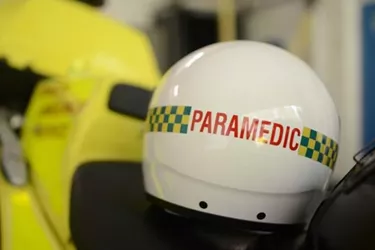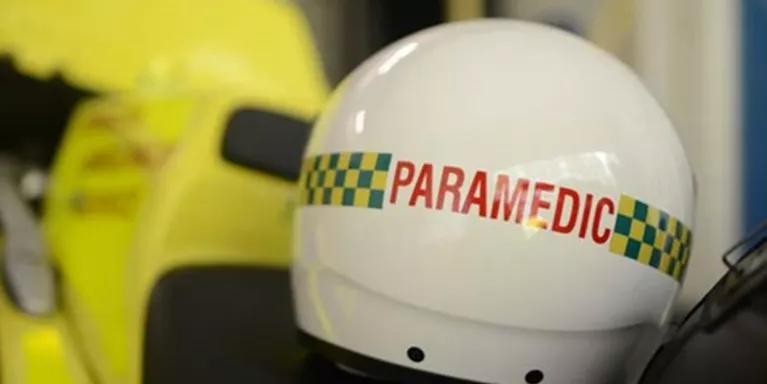Andy's story
Andy, a search and rescue winchman paramedic, shares his experience of post-traumatic stress disorder and explains how talking to someone helped him feel – and sleep – better.
I'm currently a search and rescue winchman paramedic. In total, I've been in the emergency services for 20 years.
I initially became interested in this role out of a desire to help others and do something exciting. When I realised I could never be Spiderman, I thought being a search and rescue winchman paramedic was the next best thing.
My first experience of mental health was early in my search and rescue career; I'd rescued a patient with a serious head injury from an off-shore rig. He vomited into my eyes and mouth and his vomit contained blood. I realised after this incident that there are so many factors I am not in control of at work. Suddenly, I was seriously worried for my own health and the long-term implications due to the potential risk of infection.
Because of the blood tests, my GP was involved and he offered me the chance to see a psychiatrist. This worried me at first – did he think I was mad? What would the lads back at work say, if I said I had been to see the "shrink"? Was I going crazy? Was I not able to cope? Was I a failure? Was this the end of my dream job?
At first I didn't know what to do. But I chose to get an appointment, despite the stigma, as I knew I needed some help to get over the fear I had about my future health and about clipping onto the winch again and going to rescue someone – a job that I really loved and didn't want to stop doing.
At first I didn't know what to do. But I chose to get an appointment, despite the stigma, as I knew I needed some help to get over the fear.
Thankfully, the psychiatrist was brilliant and not at all like the stereotype I was worried about. He put me at ease immediately, we had a chat, and he explained it was perfectly normal to be feeling like this after such an incident. Fantastic – after only a few minutes I felt like my old self again and ready to get back to work and be winched.
There were three key things made that session work for me, and I think it's a great guide to help you listen. When someone feels that they want to talk: create safety and trust, listen carefully, and don't judge.
When someone feels that they want to talk: create safety and trust, listen carefully, and don't judge.
I continued to serve on Royal Air Force Search and Rescue, completed a tour of Afghanistan as a paramedic on the battlefield rescue helicopter and joined Coastguard Search and Rescue. Life was good and I never looked back.
About five years after Afghanistan, I was on holiday in France with my wife and I ducked into the shower one morning before we headed out. Suddenly, I was in an upturned Land Rover with a trapped patient in Afghanistan. (This was a job I had done out there.) It felt claustrophobic and I could feel the 50-degree heat of the day. I could feel the sand on my skin and the weight of my body armour. I could see the patient in front of me and I could feel the pressure I was under to give best care, extricate him and the danger I felt to my own life.
I closed my eyes and I could still see the patient; and when I turned the shower to cold, I could still feel the heat of the day. No matter how hard I scrubbed, I could not get rid of the feeling of sand on my skin. This was a very frightening experience and the best way I can describe it is like having a nightmare when you are awake. When I got out of the shower and came through to my wife, I must have looked terrible because straight away she was very concerned for me and asked what was wrong.
I was so scared now – had I got PTSD? I didn't want to admit this to myself, let alone my wife. How could this happen out of the blue five years later? What was wrong with me?
Very quickly I decided that I would tell her what I had experienced in the shower. Immediately, I felt a little better and gradually things got back to normal for me. I could continue with our plans for the day and I haven't had another flashback since. It did take me a couple of days to get back in the shower, but I did.
My wife saved my life that day because she created safety and trust, listened carefully and didn't judge.
More recently, during my Bristow Peer Trauma Support training, I realised that I was showing symptoms of grief, burnout or stress. This presented primarily by not sleeping well over an extended period.
I knew it was good to talk, so I spoke to one of the trainers and we had a chat to explore my issues. These stemmed from an intense three-year period of caring for and losing my father and my mother-in-law, moving house, setting up a company, changing job, lots of travelling for work and then getting a promotion in UK Search and Rescue, with increased workload and pressure.
Immediately I started to feel better, just by talking, because my listener created safety and trust, listened carefully, and didn't judge.
He suggested to me that, as well as grieving, I might have temporary depression. This was when I realised that, despite my own campaigning for mental health, I still carried some self-stigma about my own mental health. He asked me what was so terrible about admitting that I might have temporary depression. I couldn't think of anything and, after a short time, I agreed it was possible and that there was nothing bad about admitting this. This illustrated to me how deeply instilled the stigma can be, even in someone who would consider himself a mental health advocate and campaigner.
I realised that, despite my own campaigning for mental health, I still carried some self-stigma.
Since then, I have not looked back.
I feel much better, am sleeping well again and am tackling 21st century life in a manner to which I did previously – however I look after myself better as I go.
Practising mindfulness has been an incredible help to think clearly, have focus and sleep consistently. Try it and you will be amazed how much better you can feel for a simple investment in yourself for a few minutes a day. I recommend trying an app such as Calm.
This last example of how my mental health was affected by normal life does not involve a traumatic incident from working in UK Search and Rescue. This is just the cumulative effect of "normal" 21st century life, and I have included this to show the importance of looking after yourself, and your colleagues and friends around you, by noticing if they are not their normal selves.
Having the courage to talk about my perceived weaknesses or problems in these three instances in my career has made me a stronger and healthier individual in the long term, but it was not easy. I am still doing a job I love and that's why I'm recommending that, whatever is bothering you, don't bottle it up. Find someone you trust and tell them about it.
You are not alone. Speak to someone you trust and share your feelings. This often helps you feel better and find a way forward.
We are one big 999 family in the emergency services. Look out for your friends and colleagues and support them when they need it. Break the stigma of mental health in our role. Be aware of using poorly-judged humour around this subject or excluding someone who needs your understanding and support. Try to create safety and trust, listen carefully, and don't judge – these are the three steps that have worked so well for me in the past.
Know the support networks available to help members of your organisation, volunteer to be a mental health champion, peer supporter or Blue Light Champion. Break the stigma around mental health.
You are not alone. Speak to someone you trust and share your feelings. This often helps you feel better and find a way forward. There are lots of support networks out there with people who have been in very similar positions, waiting to listen and help. It's OK to talk.


Information and support
When you’re living with a mental health problem, or supporting someone who is, having access to the right information - about a condition, treatment options, or practical issues - is vital. Visit our information pages to find out more.
Share your story with others
Blogs and stories can show that people with mental health problems are cared about, understood and listened to. We can use it to challenge the status quo and change attitudes.















